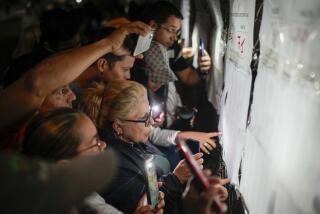Kyrgyz Vote Is a Landmark, if Not a Contest
- Share via
ALEKSEYEVKA, Kyrgyzstan — The unemployed young man was keeping an eye on his family’s five milk cows as he sat on a leaking water pipe under the burning Central Asian sun.
Marat Sagynaly, 21, says life has not changed much since March protests ousted President Askar A. Akayev. “People are just surviving here, not really living,” he said of this village 40 miles west of the Kyrgyz capital, Bishkek. “Life is very hard.”
Yet as this poor, mountainous nation heads to the polls today in what may be the freest presidential election ever seen in post-Soviet Central Asia, Sagynaly says he will cast his ballot for acting President Kurmanbek Bakiyev.
Public expectations here were boosted by the largely nonviolent revolution March 24, which was inspired by recent revolts against electoral fraud and corruption in Georgia and Ukraine.
Led by Bakiyev, the Kyrgyz reformers who took power when protesters stormed the presidential offices that day expect to legitimize their power with victory at the polls. But they know that widespread hopes for quick progress put them under enormous pressure to deliver results.
Much remains unsettled here. People remember the looting that erupted the night after Akayev fled the country. Although nearly all the damaged stores have been repaired, ordinary citizens and presidential candidates stress the need for stability and security. There is also a strong desire for good international relations. Both the United States and Russia have military bases near Bishkek, and this mostly Muslim country of 5 million serves as a staging area for U.S.-led coalition forces fighting in Afghanistan.
Critics charge that Bakiyev, a former prime minister under Akayev, has moved too slowly to replace top officials, and that his government has in effect been a continuation of the former regime. Responding to that accusation in a televised debate Thursday, Bakiyev stressed his record of government service.
“I was asked to take these posts,” he said. “Wherever I worked, beginning from 1990 to today, I have worked with honor and dignity.”
Bakiyev, who is running against five other candidates, is viewed as the strong favorite. The biggest threat to his winning a first-round victory is the possibility that more than 50% of the electorate might not participate. If that happens, or if the leading vote-getter does not receive half the ballots cast, a second round will be held between the top two finishers.
Analysts say a democratic Kyrgyzstan prospering in cooperation with both the West and Russia would be an unsettling model for authoritarian neighbors such as oil-rich Kazakhstan and Uzbekistan. The latter also is home to a U.S. base used for operations in Afghanistan. Other nearby former Soviet states include Tajikistan, which is poorer, and Turkmenistan, which enjoys oil and gas deposits but has a dictatorial president.
The March revolution here has raised hopes among democracy activists and opposition leaders in other Central Asian states, while prompting authorities in Kazakhstan and Uzbekistan to tighten their grip.
But Kyrgyz democracy itself remains tenuous.
Today’s election is not a contest between the country’s two strongest leaders, as it had promised to be. Bakiyev, who comes from the country’s poorer and more tradition-oriented south, has teamed up with northerner Felix Kulov, Akayev’s former security chief. Kulov was imprisoned after breaking with his former boss. The strongest potential challenger to Bakiyev, Kulov pulled out of the race after he was promised the prime minister’s post.
Many in the relatively prosperous north, divided from the south by a high mountain range, will vote for Bakiyev because Kulov is his running mate.
“It would be better if Kulov were the president,” Sagynaly said. “I like Kulov because of his personality. He’s strong.”
Kulov and Bakiyev feared that a contest between the two would have split the reformist camp, stalled the momentum of the March revolution and possibly led to violent clashes.
“Neither northerners nor southerners would fight against each other, but as politicians we are obligated to foresee what could happen,” Kulov explained at a news conference Thursday. “If we were to have an approximately equal number of votes, there are certain forces who would try to aggravate the situation and raise it to the level of civil disobedience.”
Kulov cited a recent clash in the eastern Uzbekistan city of Andijon as an example of the dangers that Kyrgyzstan could face if the populace were divided.
That May 13 incident began when gunmen staged a prison break that freed respected local business leaders accused of Islamic extremism. Crowds gathered in the city’s central square to support the freed prisoners and to voice anger at the government, action that many here believe was inspired by the success of Kyrgyzstan’s revolt. Police and soldiers fired on crowds that included both armed and unarmed protesters. By official count, 173 people died, but human rights activists put the toll at several hundred.
“We could not afford such risks,” Kulov said. “That is why the tandem [ballot] was created.”
More to Read
Sign up for Essential California
The most important California stories and recommendations in your inbox every morning.
You may occasionally receive promotional content from the Los Angeles Times.













